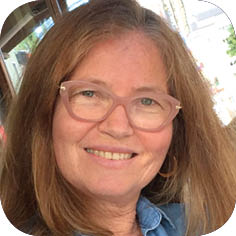Al-Nahda Charitable Society Women’s Center in Abu Dis was opened in 2005 following the thorough renovation of a house that is more than a hundred years old. The purpose of establishing this center was to create a place where women could meet, share thoughts and ideas, and learn from and support each other, away from their daily chores and responsibilities. One objective was to encourage the women to take more active roles and responsibilities in their local community by strengthening their self-awareness and to provide opportunities to participate in local activities. Another objective was to offer possibilities for education and income generation through the preservation of cultural heritage and tradition. A third objective was to provide health services and work against gender-based violence.
The center’s core values include openness and respect for all women, social/economic belonging, and independence from religious or political affiliation.
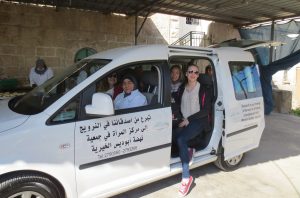
The embroidery project started with a private donation of about US$ 6,000 from a Norwegian woman who wanted to contribute to a project in Palestine at the end of 2007. What could be better than to assist Palestinian women who live behind the separation wall to provide some income for their families? Materials, tools, and high-quality thread were procured. Soon, women from Abu Dis and the surrounding areas – Ezariyeh, Sawahreh, and Al-Jahalin communities – were eagerly discussing designs, colors, and types of products to make.
Since the project took off in 2007, more than 40 women each year have earned some income from their beautiful work. Most of the participants are housewives who can easily do their embroidery at home when they are not tending to their children or household chores. Single women have gained confidence and pride by being able to support themselves and even contribute to their larger family. Having the possibility to leave their homes to receive work gives these women the chance to participate in other activities at the Women’s Center, such as lectures, discussion groups, and consultations with a nurse, a social worker, a legal adviser, and the gynecologist who operates the small clinic at the center.
Income-generating activities that focus on embroidery help to support livelihoods and build pride among participants at Abu Dis Women’s Center.
The women are producing everything from small purses, coasters, and bags of various sizes, to beautiful cushions, shawls, and large tablecloths. Old traditional patterns guide the designs and are transformed into practical items in a multitude of colors to make them modern and attractive.
The income from sales is shared to provide a fair wage to the women, pay for materials, and cover part of the center’s running costs. Most of the sales are done through friends and networks in Norway, though home parties and Christmas markets as well as through the Palestine shops in Bergen and Oslo. The products even have a brand name – “DISI” – and a Facebook page that documents the various events (@KvinnesenteretiAbuDis). Importantly, the small start-up fund was enough to initiate the project, but the commitment and efforts of the women and the income from sales have ensured the sustainability of the activities throughout the past years.
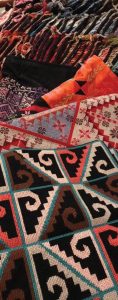
In 2010 the Women’s Center was invited to participate in a school canteen project, initiated by UN Women, with financial support from the Norwegian Representative Office to the Palestinian Authority. The purpose was twofold: to build capacity at Palestinian women’s centers and thereby generate income, and to produce nourishing, affordable snacks for school children at local schools, in collaboration with the Ministry of Education. A main objective was that healthy food leads to healthy children and hence a better basis for learning and well-being. Joint awareness activities and school health days are part of the activities. The collaboration with UN Women offered the opportunity to network with other women’s centers in the West Bank, and exchange visits with other centers are part of the annual program.
Locally produced snacks for school canteens lead to healthier children. Health care and the promotion of well-being are important services provided by the center.
The project was supported during the first two years through extensive training sessions in procurement, production, sales management, and accounting, in addition to the provision of support for rental fees at the school canteens and the purchase of some equipment. After that, it was up to the women themselves to determine whether the project would continue. Although the project has suffered from school closures due to strikes and military activities, the canteens have continued to operate at seven local schools for girls and boys of all ages. A normal day witnesses the preparation of several hundred falafel sandwiches, about 800 mini-pizzas, and a number of cheese, za’atar, and chicken sandwiches. Special days are allocated for mujaddara, other hot lunches, and salads. When the women come to the canteen, the children are already lining up. “It feels like they are my own children,” says Zohra, one of the canteen workers. Another component of the project is hot-meal delivery to local organizations and summer camps.
Financial assistance from private persons collected through the Norwegian Christian Student Association and the Norwegian Labour Union Study Association (AOF) Haugaland branch, has made it possible to invest in a car, an oven, a professional kneading machine, an industrial fan to create a healthy working environment, and the installation of three-phase electricity in the bakery. The latest addition is a large fridge, which makes possible the cost-effective procurement and preservation of large quantities of food products. The car assists in transporting both the women and the food to the canteens. And of course, the driver, Amira, is a very proud woman, who holds both a normal driving license and a truck-driver license as well. The project ensures regular income for 18 women from the area.
Zohra’s husband did not initially like the idea of his wife working in a bakery. But with the encouragement of her mother, Zohra started anyway. When her husband realized how happy she had become because of her work, he gave her his full support. She has been working in the school canteen project for more than seven years and says that the work has changed her life.
In collaboration with the Palestinian Family Parenthood and Protection Association, the Women’s Center runs a project that focuses on sexual and reproductive health and rights that has been supported by the Representative Office of Norway for 11 years. Health services are provided by a part-time gynecologist at the center’s clinic. Services offered include family planning, marital counseling for newly married couples, pap smears, and referrals for mammography. During the last two years alone, and as a result of the screening and follow-up provided by the center’s clinic, 17 women were diagnosed with breast cancer and one woman with cervical cancer. These women are now engaged in a network of other cancer survivors and collaborate with the Patient’s Friends Society to raise awareness and provide support for women who are diagnosed with cancer. In the beginning, the women were embarrassed about having such tests and thought that they were unnecessary. But now they encourage each other as they know how important it is that cancer be discovered at an early stage. A social worker, a nurse, and a lawyer provide educational sessions and counselling for both groups and individuals of both genders, with people from local partner NGOs benefiting as well. This includes assistance to women victims of violence as well as perpetrators, often a family member, and close collaboration with the PA police. Home visits and health days are also organized for the neighboring Bedouin communities.
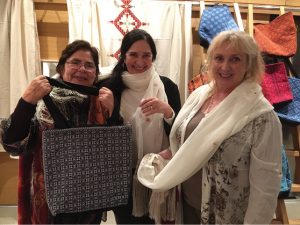
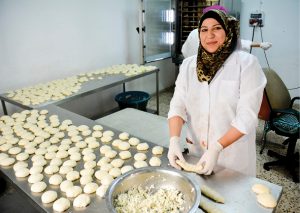
Participation in activities at the Women’s Center has opened the way for new friendships, relationships, and experiences. Mothers get to know the women who teach their children at schools and kindergartens. Many volunteers from Al-Quds University get involved in the local community activities and assist in advocating for gender equality, nonviolence, and peer support. It is a joy to hear the women at the center speak about preparing for their annual outing and trying to decide where to go. For many of these women, this is one of the few times when they have the chance to travel and see other parts of their country. It is a big event to watch busses fill up with laughter, the smell of delicious cooking and sweets, and the children who squeeze in beside their mothers. We do not want to leave anyone behind!

